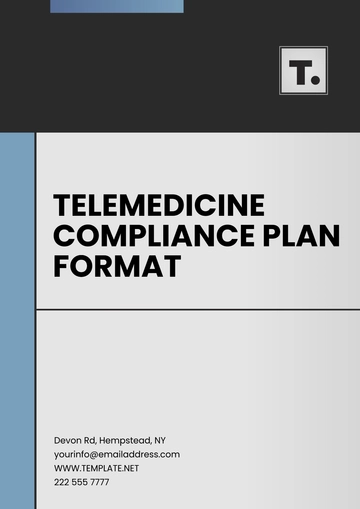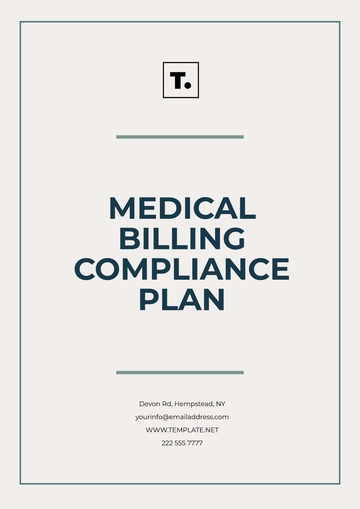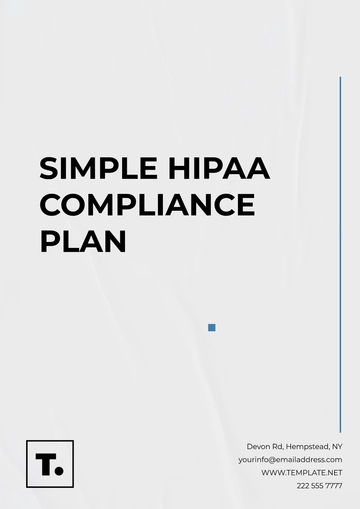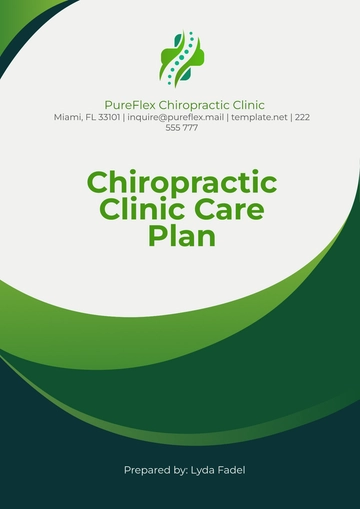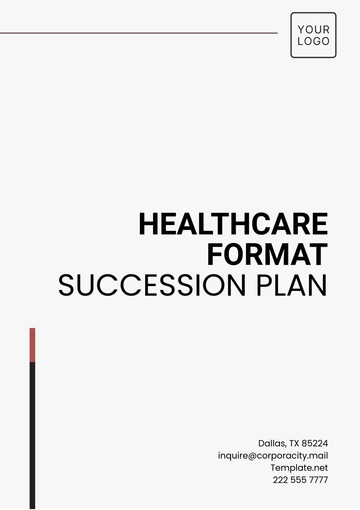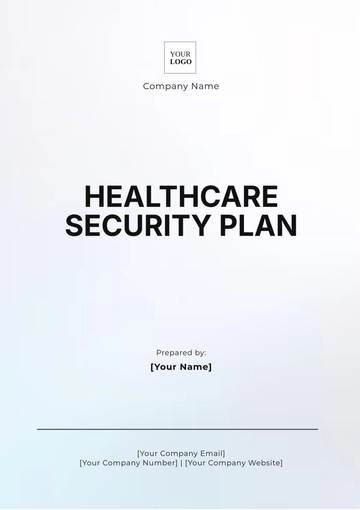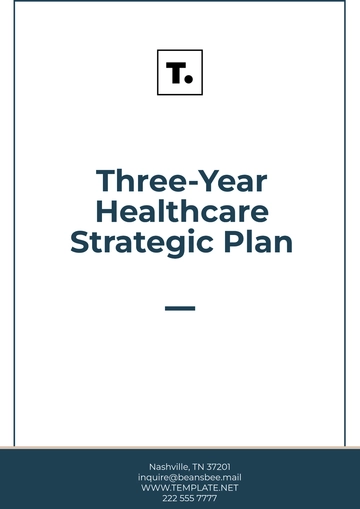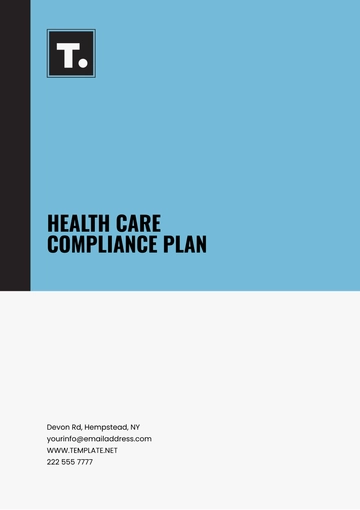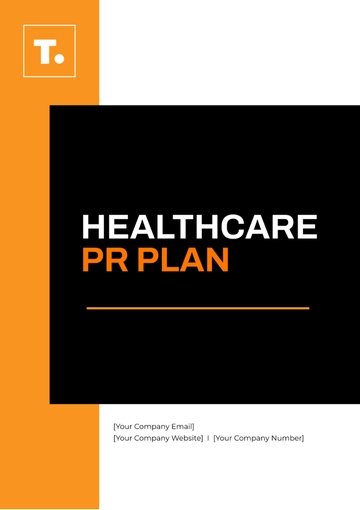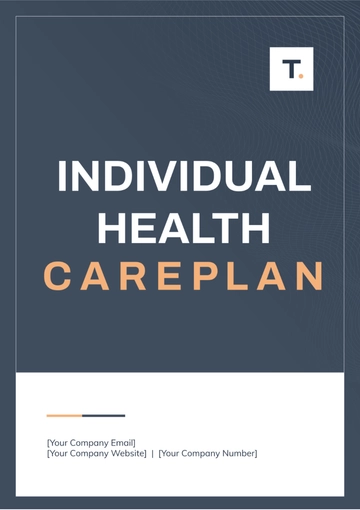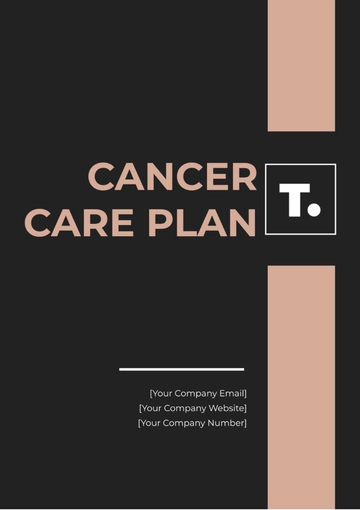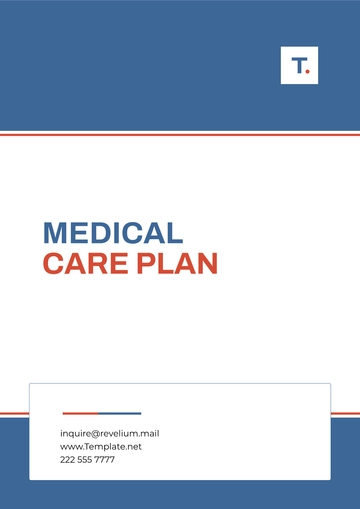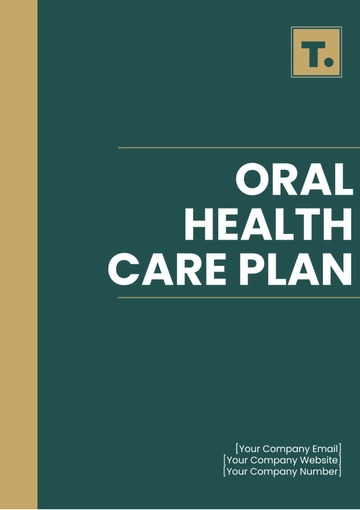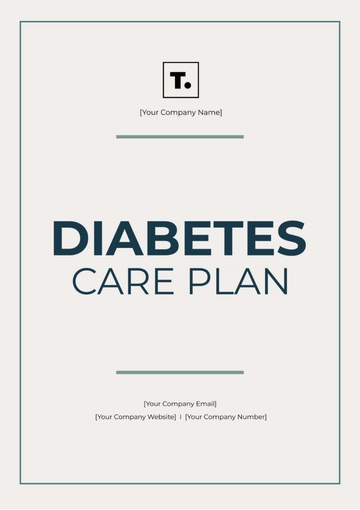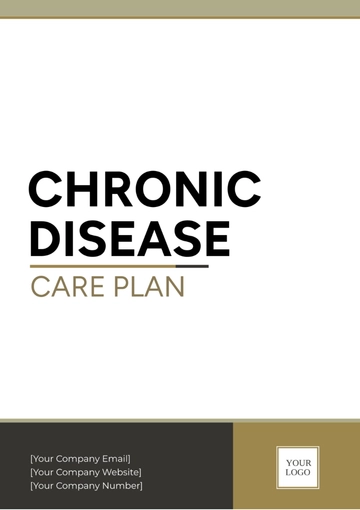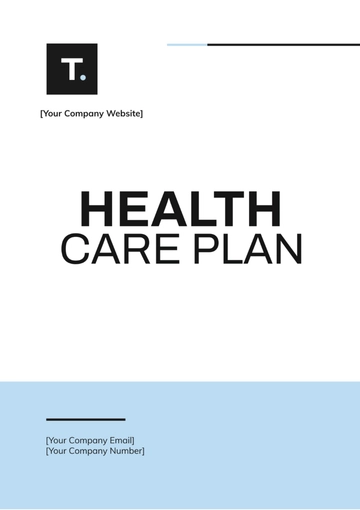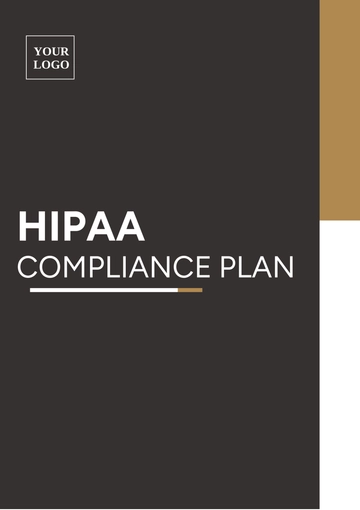Free Health Care Plan
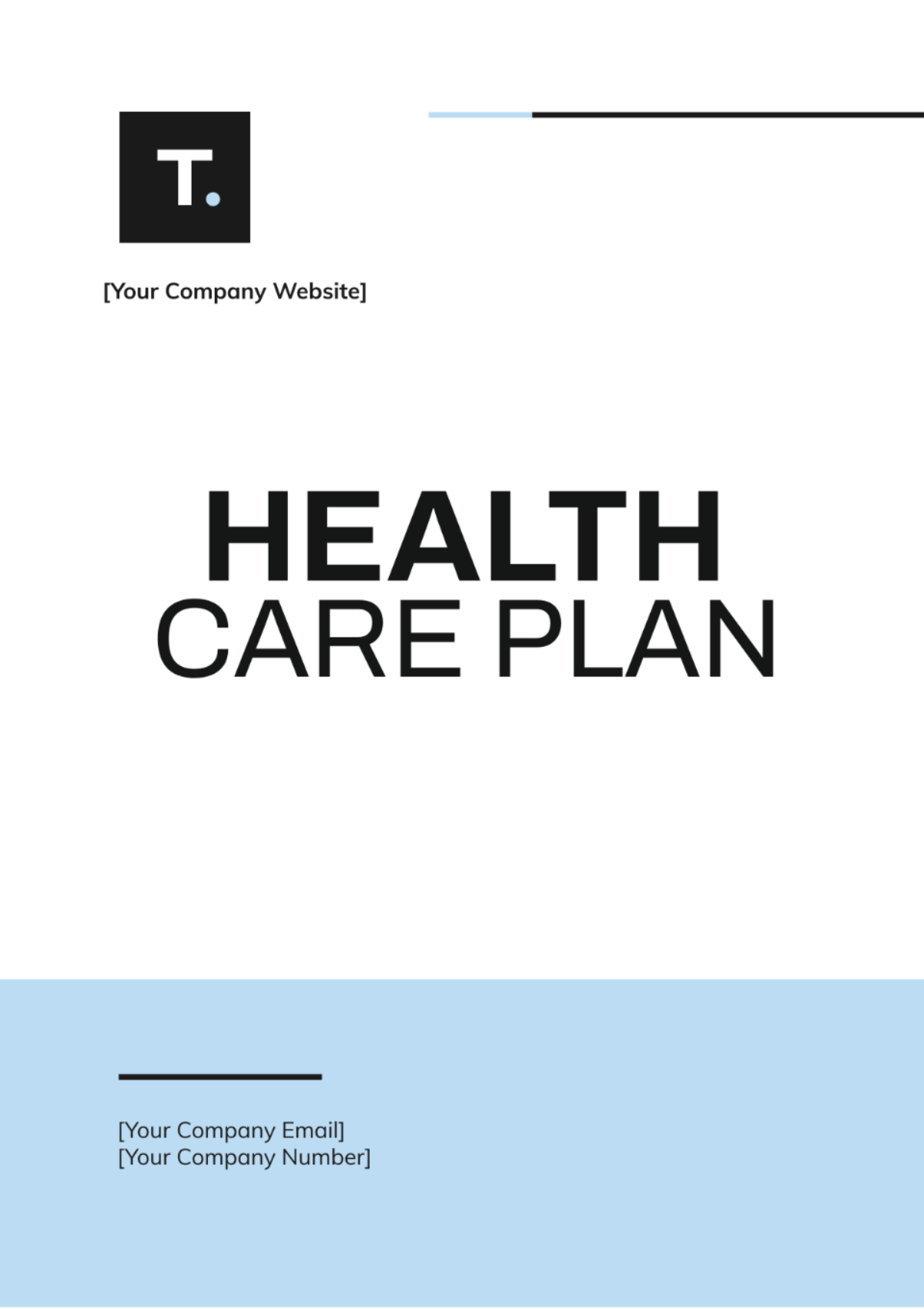
Prepared by: [Your Name]
Date: [Date]
I. Introduction
The Health Care Plan outlines protocols and procedures for medical professionals to effectively diagnose, treat, and manage various health conditions. This plan aims to ensure consistent and high-quality care delivery across all healthcare settings.
II. Scope and Objectives
The scope of this plan encompasses the diagnosis, treatment, and management of a wide range of health conditions, including but not limited to:
Infectious diseases
Chronic illnesses
Mental health disorders
Acute medical emergencies
The objectives of this plan are to:
Standardize diagnostic processes to ensure accurate identification of health conditions.
Implement evidence-based treatment protocols to optimize patient outcomes.
Facilitate effective communication and collaboration among healthcare providers.
Promote patient education and empowerment in self-management strategies.
III. Diagnostic Protocols
A. History Taking
Comprehensive patient history including past medical history, family history, social history, and medication history.
Detailed symptom assessment to identify specific patterns and severity.
B. Physical Examination
A comprehensive physical examination is conducted to evaluate the vital signs, the general appearance of the patient, the functionality of various organ systems, and to observe any relevant physical findings that might be of medical significance.
C. Diagnostic Tests
Utilization of appropriate laboratory tests, imaging studies, and other diagnostic procedures based on clinical suspicion.
IV. Treatment Guidelines
A. Pharmacological Interventions
Selection of medications based on established guidelines, considering efficacy, safety, and patient-specific factors.
Dosage adjustment and monitoring for adverse effects and therapeutic efficacy.
B. Non-Pharmacological Interventions
Implementation of lifestyle modifications, dietary changes, and physical activity recommendations.
Referral to allied health professionals for specialized interventions (e.g., physiotherapy, nutrition counseling).
V. Management Strategies
A. Care Coordination
Multidisciplinary team involvement to ensure comprehensive care delivery.
Clear delineation of roles and responsibilities among healthcare providers.
B. Follow-Up and Monitoring
Regular follow-up appointments to assess treatment response, adjust management plans, and address any emerging concerns.
Monitoring of disease progression and potential complications through objective measures and patient-reported outcomes.
VI. Patient Education
A. Disease Understanding
Provision of clear and concise information about the patient's health condition, including etiology, prognosis, and treatment options.
Discussion of potential lifestyle modifications and self-care strategies to optimize health outcomes.
B. Medication Adherence
Education focuses on the importance of adhering to prescribed medication regimens, understanding potential side effects associated with medications, and identifying strategies to overcome barriers that might impede adherence.
VII. Emergency Management
A. Recognition and Triage
Prompt recognition of medical emergencies based on established criteria.
Timely triage and initiation of appropriate interventions to stabilize the patient's condition.
B. Emergency Response Protocols
Implementation of uniformly agreed-upon procedures for the management of widespread medical emergencies such as cardiac arrest, anaphylactic reactions, and episodes of respiratory distress.
VIII. Quality Improvement
A. Continuous Evaluation:
Regular review of clinical outcomes, adherence to protocols, and patient satisfaction metrics.
Identification of areas for improvement and implementation of quality improvement initiatives.
B. Staff Training and Development
Regularly scheduled educational and training sessions are conducted to ensure that healthcare providers remain informed about the most recent evidence-based practices and protocols.
IX. Conclusion
The Health Care Plan provides a comprehensive framework for diagnosing, treating, and managing various health conditions. By adhering to standardized protocols and procedures, healthcare professionals can optimize patient outcomes and promote quality care delivery. Continuous evaluation and quality improvement efforts are essential for maintaining the effectiveness and relevance of this plan.
- 100% Customizable, free editor
- Access 1 Million+ Templates, photo’s & graphics
- Download or share as a template
- Click and replace photos, graphics, text, backgrounds
- Resize, crop, AI write & more
- Access advanced editor
Discover the ultimate solution for crafting comprehensive health care plans with the Health Care Plan Template from Template.net. This editable and customizable template ensures precision and efficiency in outlining medical strategies. Seamlessly tailor your plans to perfection using our intuitive Ai Editor Tool. Elevate your healthcare management game effortlessly with this indispensable resource.
You may also like
- Finance Plan
- Construction Plan
- Sales Plan
- Development Plan
- Career Plan
- Budget Plan
- HR Plan
- Education Plan
- Transition Plan
- Work Plan
- Training Plan
- Communication Plan
- Operation Plan
- Health And Safety Plan
- Strategy Plan
- Professional Development Plan
- Advertising Plan
- Risk Management Plan
- Restaurant Plan
- School Plan
- Nursing Home Patient Care Plan
- Nursing Care Plan
- Plan Event
- Startup Plan
- Social Media Plan
- Staffing Plan
- Annual Plan
- Content Plan
- Payment Plan
- Implementation Plan
- Hotel Plan
- Workout Plan
- Accounting Plan
- Campaign Plan
- Essay Plan
- 30 60 90 Day Plan
- Research Plan
- Recruitment Plan
- 90 Day Plan
- Quarterly Plan
- Emergency Plan
- 5 Year Plan
- Gym Plan
- Personal Plan
- IT and Software Plan
- Treatment Plan
- Real Estate Plan
- Law Firm Plan
- Healthcare Plan
- Improvement Plan
- Media Plan
- 5 Year Business Plan
- Learning Plan
- Marketing Campaign Plan
- Travel Agency Plan
- Cleaning Services Plan
- Interior Design Plan
- Performance Plan
- PR Plan
- Birth Plan
- Life Plan
- SEO Plan
- Disaster Recovery Plan
- Continuity Plan
- Launch Plan
- Legal Plan
- Behavior Plan
- Performance Improvement Plan
- Salon Plan
- Security Plan
- Security Management Plan
- Employee Development Plan
- Quality Plan
- Service Improvement Plan
- Growth Plan
- Incident Response Plan
- Basketball Plan
- Emergency Action Plan
- Product Launch Plan
- Spa Plan
- Employee Training Plan
- Data Analysis Plan
- Employee Action Plan
- Territory Plan
- Audit Plan
- Classroom Plan
- Activity Plan
- Parenting Plan
- Care Plan
- Project Execution Plan
- Exercise Plan
- Internship Plan
- Software Development Plan
- Continuous Improvement Plan
- Leave Plan
- 90 Day Sales Plan
- Advertising Agency Plan
- Employee Transition Plan
- Smart Action Plan
- Workplace Safety Plan
- Behavior Change Plan
- Contingency Plan
- Continuity of Operations Plan
- Health Plan
- Quality Control Plan
- Self Plan
- Sports Development Plan
- Change Management Plan
- Ecommerce Plan
- Personal Financial Plan
- Process Improvement Plan
- 30-60-90 Day Sales Plan
- Crisis Management Plan
- Engagement Plan
- Execution Plan
- Pandemic Plan
- Quality Assurance Plan
- Service Continuity Plan
- Agile Project Plan
- Fundraising Plan
- Job Transition Plan
- Asset Maintenance Plan
- Maintenance Plan
- Software Test Plan
- Staff Training and Development Plan
- 3 Year Plan
- Brand Activation Plan
- Release Plan
- Resource Plan
- Risk Mitigation Plan
- Teacher Plan
- 30 60 90 Day Plan for New Manager
- Food Safety Plan
- Food Truck Plan
- Hiring Plan
- Quality Management Plan
- Wellness Plan
- Behavior Intervention Plan
- Bonus Plan
- Investment Plan
- Maternity Leave Plan
- Pandemic Response Plan
- Succession Planning
- Coaching Plan
- Configuration Management Plan
- Remote Work Plan
- Self Care Plan
- Teaching Plan
- 100-Day Plan
- HACCP Plan
- Student Plan
- Sustainability Plan
- 30 60 90 Day Plan for Interview
- Access Plan
- Site Specific Safety Plan
